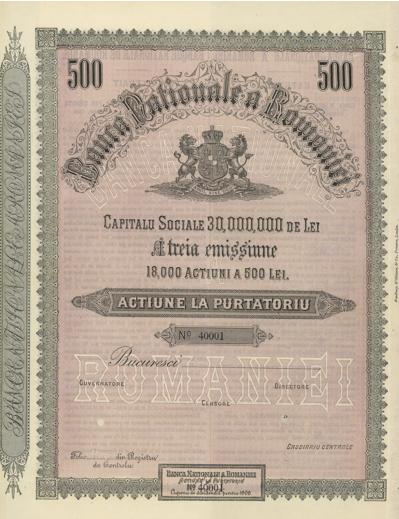After Romania lost the battle of Turtucaia (Tutrakan, now in Bulgaria) and after the invasion of Wallachia by the German imperial armies in 1916, the Romanian royal family, the government and the state institution sought refuge in Iasi. The National Bank of Romania (BNR) headed by governor Ioan Bibicescu moved its headquarters to Iasi, the new capital during the occupation, until the liberation in 1918. A handful of bank clerks and their directors Nicolae Barbulescu and Constantin Baicoianu were left in Bucharest, in enemy-controlled territory, within a subsidiary with limited powers.
And the occupation began with an „attack” against the national currency, Baicoianu, who directly witnessed it, in his work ‘The National Bank During the Occupation, November 1916 – November 1981’, published shortly afterwards, in 1919. Specifically, the German authorities decided to arbitrarily cut by decree the exchange rate of the leu against the German mark by more than 6%, from 1.25 lei/mark (also set by the occupiers) to 1.33 lei/mark. One year later, the official devaluation was pushed to 1.4285 lei/mark.
„This devaluation of the leu was not justified by any serious economic argument. Very limited monetary trading was carried out on the market. Also, there were no foreign payments, as the trade was hindered by war; furthermore, the fact that we were the supporting factor of the German-Romanian trade, by our exports to Germany, while Germany had almost nothing to send in exchange, far from justifying the devaluation of the leu, should have actually warranted the contrary, the raise. But the latter expectation, resulting from the natural exchange trading, had been vitiated by the abusive intervention of the German iron fist who – lowering the leu and raising the mark above the legal rate – aimed at robbing Wallachia including by this forced devaluation of the Romanian currency”, wrote BNR director Baicoianu.
The BNR heads left in Bucharest, alongside most of the general managers of commercial banks, officially protested the devaluation in a memorandum to the imperial command of the capital – to no avail. Moreover, their approach triggered retaliations from the Germans; Baicoianu was arrested and detained in Bulgaria for one year.
Meanwhile, the occupiers moved to more direct and open aggression. On December 6, 1916, German troops arrived at the BNR headquarters to commandeer the building, including the governor’s residence, for use by the imperial military administration.
The abuse was all the more blatant as by then, and since 1901, the National Bank was a wholly private-owned institution, even if one of public interest and with vital attributes, set by law, regarding Romania’s economic and financial policies. Also, the 1899 and 1907 Hague Conventions with respect to the Laws and Customs of War on Land stipulated the respect for and inviolability of the enemy’s private property, denying the invaders the owning and use of this wealth.
One step was all it took to advance from the building to the institution itself. Thus, in March 2017, the German occupiers seized the National Bank and put it under mandatory administration. The pretexts used to give this step a legal appearance was that significant parts of BNR’s wealth were abroad, and most of the upper management, including the governor, were not in Bucharest, but in Iasi.
„The National Bank, this supreme expression of our national economic concentration, envied as a liberal offspring, had to be crushed, because it hindered their aspiration of German dominance. (…) The Bank’s entries were placed under military guard as early as March 4. The Bank remained closed for 15 days. During this, with the heads of various services present, based on detailed acts signed on March 3, the delegate director consigned the cash register, the deposits and the discount, and after this operation he handed to the bailiffs the keys of all the treasuries and safes of the Bank. The valuables of the offices in Craiova, Turnu Severin, Targu Jiu, Ramnicu Valcea, Slatina, Giurgiu and Campulung, all held in Bucharest at the time, were also taken over. On March 19, the Bank was reopened, this time under the direction of bailiffs von Witzleben and Austrian professor Schnabel”, wrote Constantin Baicoianu.
He also mentions that the first measure taken by the bailiffs-administrators after taking over the BNR subsidiary left in Bucharest was to dismiss nearly two thirds of the employees, as the military authorities had decreed that only the minimum necessary staff should be kept. Moreover, the payment of pensions and indemnities for the families of BNR staff mobilized on the front lines was prohibited.
„Nevertheless, the bank’s staff, aware of its dignity, did not bow to the enemy; on the contrary, they submitted and endured all the humiliations imposed by the harshness of brute force. The delegation (the Romanian management of the BNR subsidiary left in Bucharest), to prevent the foreseeable shortcomings of layoffs, decided the day before the commandeering to take 600,000 lei in cash for paying the salaries of the staff to be terminated”, the book also mentions.
According to this source, the final blow prepared by the German administration for Romania’s finances was to determine the BNR to turn – illegally and against its statute and regulations – by different means into an ‘irresponsible printer’ of money not back by gold, to be used by the occupiers for buying the products of the Romanian economy, a plan resisted by BNR with all its forces.
„The National Bank, aware that its own value and especially its own role in the fabric of our economic and financial life, based on the law and on its founding statutes, which placed it among the private institutions and guaranteed it the support of international laws, has assumed from the beginning the position dictated by its nature. Thus, without having anything in common with the State on which the winners, by the international laws, had all the rights, it remained free, master of its own movements. Based on its rights guaranteed by the international laws, it never accepted to abdicate from any of its statutory prerogatives, not regarding the operation, not – even less so – regarding its administrative organization that ensured it such a glorious past and such an obvious prosperity that the enemy recognized it on various occasions. Because, in accordance with its founding statute, not the State, but its own Board and ultimately its shareholders, through the voice of their assembly, had the power of validly deciding in all the issues raised by the German Command, the National Bank placed itself from the beginning on this legal ground”, observers Baicoianu.


COMMENTS